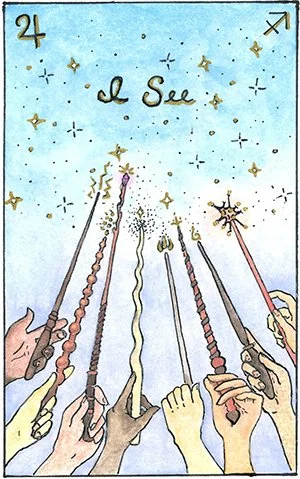Sagittarius (22 November - 21 December)
original art by Bex Kingsley
John Kennedy Toole - Victim of the Confederacy
John Kennedy Toole’s (17 December 1937 – 26 March 1969) rise to prominence was less a rise and more of a sine wave with the occasional loop-the-loop thrown in to make things interesting.
The tarot card for this month is the 8 of wands, a card whose upright meaning is excitement and sudden changes. While he only lived 31 years, what he packed into that short three decades was extraordinary.
To begin with, his mother Thelma, gave private lessons in speech, music, and “dramatic expression.” Thelma was the kind of parent who measured her own success, in part, by her son’s. To that end, she encouraged his education, and when he was 10, organized a group of 50 child entertainers, including her son, who performed a variety of acts. On the back of this success, Toole went on to more acting on the stage and radio, even doing a solo show of impersonations. His Sagittarius need to explore his options was only just getting started.
He began writing in high school, where his first output was essays, and later speeches, and at the age of 16 wrote the first of the two novels he finished in his lifetime, The Neon Bible. While he later described it as “adolescent” (and why shouldn’t it be – he was an adolescent when he wrote it), he re-visits some of its themes in his later book. Despite his dislike of the book and the general opinion that it wasn’t good, it was published 8 years after his only other book won the Pulitzer Prize.
Sagittarians love to travel, and at 17, he made his first trip out of his home state of Louisiana to visit Philadelphia, New York City, and Washington, D. C. – locations that featured in his best-known work, A Confederacy of Dunces. In fact, many of his life experiences made it into the book’s pages, including helping a friend sell food from a cart he pushed around town, working at a clothing manufacturing business, and dating a woman who lived in New York.
By the time he graduated high school, he had received a hefty list of accolades and went on to graduate from Tulane at the age of 21. He taught for a year at University of Louisiana at Lafayette where he was popular as a wit and wag. He left Louisiana to study in New York, he went on to become the youngest professor in Hunter College’s history at the age of 22. While teaching, the only times he shut down socially coincided with his mother’s visits, which subjected him to the kind of restrictions and limitations, negativity and drama that those born under Sagittarius particularly dislike.
Toole was drafted into the army in 1961, where he taught English to Spanish-speaking recruits in Puerto Rico. True to his Sagittarian nature, he excelled in the army as he had in academia, although the routine and monotony, along with excessive alcohol consumption, led to a period of severe depression. It was in Puerto Rico that Toole began A Confederacy of Dunces.
Reversed, the 8 of wands portends bad timing, and the end of Toole’s life must have felt, after so much success and recognition, like one insult after another. He received a hardship discharge from the army to care for his parents. His father was experiencing increasing incidents of fear and paranoia, so Toole took a teaching post that allowed him the free time to finish his masterwork.
Once he had completed his novel, he sent it to Simon & Schuster, but after two years of back and forth where the publisher asked for edits that Toole was unwilling to make, publication fell through. Toole took the rejection of his book personally, and although he began another novel, he was still seeking a publisher for Dunces. More rejection led to more depression, and by 1967, his good friend David Kubach noticed his declining mental state. Sagittarians tend to form their opinions based on nothing more than emotion, and the combination of rejection, increasing alcohol consumption, and intense headaches for which he refused the treatment his doctor suggested, made him feel that people were plotting against him.
His declining mental state affected his teaching, and he was dismissed from his teaching position in late 1968, striking a final blow to an already troubled mind. In January 1969, he died by suicide.
You’d think that the bad timing presaged by the 8 of wands might end there, but two years after her son’s death, Thelma Toole began shopping her son’s manuscript around. While it took another eleven years for the book to be published, it took only one additional year for Toole to be awarded the Pulitzer Prize for Fiction based on that single work. Would Toole’s decision to take his own life been different had he been able to have his work not just published, but recognized for the work of genius that it is, sooner? It’s impossible to know, although it’s guaranteed that all those Sagittarians out there will be thinking about it.

